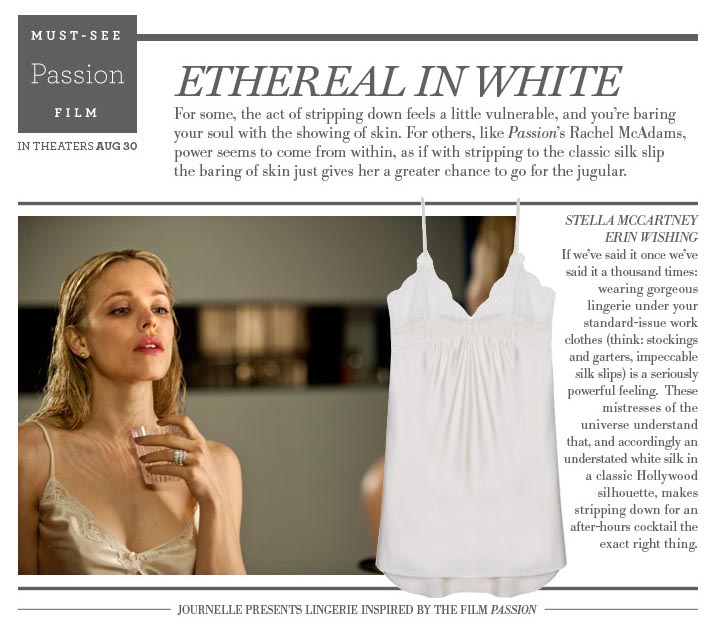
 Hello and welcome to the unofficial Brian De Palma website. Here is the latest news: |
|---|
E-mail
Geoffsongs@aol.com
-------------
Recent Headlines
a la Mod:
Listen to
Donaggio's full score
for Domino online
De Palma/Lehman
rapport at work
in Snakes
De Palma/Lehman
next novel is Terry
De Palma developing
Catch And Kill,
"a horror movie
based on real things
that have happened
in the news"
Supercut video
of De Palma's films
edited by Carl Rodrigue
Washington Post
review of Keesey book
-------------
Exclusive Passion
Interviews:
Brian De Palma
Karoline Herfurth
Leila Rozario
------------
------------
| « | August 2013 | » | ||||
| S | M | T | W | T | F | S |
| 1 | 2 | 3 | ||||
| 4 | 5 | 6 | 7 | 8 | 9 | 10 |
| 11 | 12 | 13 | 14 | 15 | 16 | 17 |
| 18 | 19 | 20 | 21 | 22 | 23 | 24 |
| 25 | 26 | 27 | 28 | 29 | 30 | 31 |
De Palma interviewed
in Paris 2002
De Palma discusses
The Black Dahlia 2006

Enthusiasms...
Alfred Hitchcock
The Master Of Suspense
Sergio Leone
and the Infield
Fly Rule
The Filmmaker Who
Came In From The Cold
Jim Emerson on
Greetings & Hi, Mom!
Scarface: Make Way
For The Bad Guy
Deborah Shelton
Official Web Site
Welcome to the
Offices of Death Records
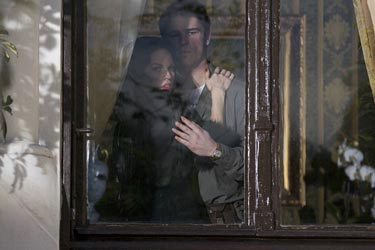 Jacob Knight at Very Aware has posted a wonderfully-written ranking of 28 Brian De Palma features (he left Dionysus In '69 off the list).
Jacob Knight at Very Aware has posted a wonderfully-written ranking of 28 Brian De Palma features (he left Dionysus In '69 off the list).Throughout the article, Knight keeps a running focus on autobiographical elements in De Palma's films, citing, for instance, Jason Zinoman's profile of De Palma for the book Shock Value in his entry on Dressed To Kill (#4). Knight's top three De Palma films are (#1) Blow Out ("the ending... solidifies Blow Out as De Palma’s bonafide masterwork"); (#2) Phantom Of The Paradise ("a careening bullet of pop art"); and (#3) Body Double (a "cinematic explosion meant to intoxicate those who are as in love with form as its director").
Also in Knight's top ten are a couple of surprises: Snake Eyes at number six, Mission: Impossible at number eight, and The Black Dahlia at number nine. De Palma's latest film, Passion, ranks at number 17. Of the latter, Knight writes, "There’s something to be said about De Palma’s choice of setting for the Berlin ad office — a towering building made entirely of glass. Not only does it feel like an on-the-nose visual representation of the 'ceiling' all female employees face as they navigate the current corporate climate, but also a metaphor for the lack of transparency all of these characters share. While we the audience can see through the walls of this crystal shrine to capitalism, each character holds up a shield of deception to stop the other from seeing their next move. It’s a brilliant bit of location scouting, as De Palma yet again finds a perfect way to convey an idea without using a single word."
At the bottom of Knight's list is Raising Cain, which Knight feels is hurt by De Palma's seeming lack of interest in that type of thriller at that point in time. And he has The Untouchables at number five, writing of the latter, "This is pulp on an epic, exciting level that takes both balls and chops in equal quantity to pull off."
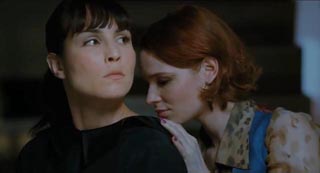 Several more interviews with Brian De Palma have posted between yesterday and today. Fandango's Robert B. DeSalvo asks De Palma what justifies a remake. "If it's a very good basic story," De Palma replies, "like when people do different versions of Shakespeare, why not interpret it many different ways? I've always thought that when you see something that is really done well, maybe it could be done again with a different viewpoint. This is something you see in all the other art forms. Whether it is an homage or whatever you want to call it, there are certain basic stories that can be retold over and over again. I'm not surprised that these movies are being remade, and the ones that I remade were because I could bring something new to the basic material."
Several more interviews with Brian De Palma have posted between yesterday and today. Fandango's Robert B. DeSalvo asks De Palma what justifies a remake. "If it's a very good basic story," De Palma replies, "like when people do different versions of Shakespeare, why not interpret it many different ways? I've always thought that when you see something that is really done well, maybe it could be done again with a different viewpoint. This is something you see in all the other art forms. Whether it is an homage or whatever you want to call it, there are certain basic stories that can be retold over and over again. I'm not surprised that these movies are being remade, and the ones that I remade were because I could bring something new to the basic material."'RAISING CAIN' RECUT BY SOME YOUNG DIRECTOR NAMED PEET GELDERBLOM
De Palma brings up the Raising Cain Recut once again in response to DeSalvo's question about any films he would like to go back and change. "In Raising Cain," De Palma says, "I initially had thought to tell the story with the wife's story. But because John Lithgow was so fascinating playing these multiple characters, I started the movie with his story. Then some young director recut it and put the wife's story first. I looked at it and said, 'You're right. That's the way it should have been done.' So, yes, my initial instinct was correct."
A YOUNG AL CAPONE ON SCREEN
DeSalvo asks whether De Palma would like to see any of his characters come back for a sequel. De Palma responds, "We were working on the prequel for The Untouchables, so a young Al Capone. But I guess they are doing that on television now [on Boardwalk Empire]. We were working on the prequel for many years, but it was under the former administration at Paramount."
DE PALMA LIKES 'KISS KISS, BANG BANG'
DeSalvo asks De Palma, "What is a guilty-pleasure movie that you love that everyone else seemed to hate?"
"A movie I really liked that didn't do well was Kiss Kiss, Bang Bang," replies De Palma. "It didn't do well at the box office, but I thought Shane Black did a fantastic job."
My favorite part of the interview is when DeSalvo says that "Passion is probably the first movie to feature someone using their toe to send a text." That leads into a discussion about how technology has changed the way we communicate with each other. When asked what is the "craziest criticism" he's ever read about him, De Palma replies, "That I'm a misogynist. I love women. I love working with women. I love to photograph them. I like stories where they are the principle characters. I'm interested in beauty and sensuality. That would be hard for someone who is supposed to be a hater of women."
NON-RETIREMENT & 'HAPPY VALLEY'
The interview concludes with these two exchanges:
De Palma: No, I would never make an announcement about that. I mean, who the hell cares?
Fandango: What movie would you like to make after Passion?
De Palma: I got interested about a year ago in the Joe Paterno case, and we're developing a screenplay for Al Pacino to play Joe Paterno. This is very distressing material, but I think we can make a really terrific movie from it. We're working on it now.
SPOILERS - ROUNDTABLE FROM LAST YEAR'S TIFF
Slant's Fernando F. Croce yesterday posted his edition of a roundtable interview De Palma did at last year's Toronto International Film Festival. In discussing the viral ad in Passion's narrative, De Palma said, "I originally had thought of an incredibly more complicated commercial, all these dreams on top of one another. It got a bit too much like Inception. I showed it to a few director friends of mine, and they all said, 'What are you, crazy? Simplify!' [Laughs]"
At one point, De Palma is asked what his intention was with the split screen in Passion. He responds, "My intention? Now, what could that be? One interpretation is quite simple: Noomi is at the ballet. We're showing her watching the ballet at the same time somebody is stalking Rachel at her house. On the half of the screen where you see the ballet, we cut to a close-up of Noomi's eyes. [Mock-excited] Aha! Well, she must be at the ballet! She couldn't possibly be at the house, now could she? Meanwhile you see all these things going on back at the house, and when the POV shots start we don't see any more close-ups of Noomi's eyes. Viewers have become conditioned to expect A to lead to B, and accept it without question. The juxtaposition of the images on the screen seals a destination on viewers' minds, but do we go there or do we undermine it? Again, the important thing is to look actively at what's unfolding before us."
Asked how the screenplay influences him as a director, De Palma replies, "I tend to start with the camera. Some directors start with the characters and then proceed from that. Paul Thomas Anderson is a good example of somebody who builds his stories from the people on screen. Same thing with Noah Baumbach. They're very different from the way I do it, but that's why I like their movies. When I think of a scene, the people in it and what they're saying are just one element in a visual frame. And I like to use the entire frame instead of cutting from shot to over-the-shoulder shot, which I find very boring and TV-ish. I love when actors can play the scene continuously, the way you see in many films from the '40s or '50s. Maybe I'm becoming a bit anti-close-up in my old age. [Laughs]"
In discussing movie studios, De Palma mentions that Mission To Mars was affected by too many producer meetings. "As much as I want to think of myself as an outsider," De Palma says, "I've been able to work within the studio system for years. If your budget gets big, producers start to have too many meetings and chip away at the movie, which was the case with Mission to Mars. I guess it was around the time of Bonfire of the Vanities, the early '90s, when I started getting piles of notes, suggestions from the producers. In the beginning, in the 'day of the director' which is now long and far gone, you could make your movie and then preview it, say, in a theater in Texas and then be handed reports on audience reaction. You could still say, 'Sorry, that's it. I'm not changing a thing,' and get away with it. That's become harder and harder, and the directors of my generation just no longer have the stamina to deal with it. Hence our crotchetiness. [Laughs]"
When asked if he has any comments on Peter Biskind's book Easy Riders, Raging Bulls, De Palma pauses, then chuckles before saying, "There's something very interesting about books like that. Here's my question: 'Who's talking to the writer?' Is it the unhappy ex-girlfriend? The bitter producer? The partner who got screwed out of some deal? They sure do a whole lot of talking, don't they? But the people who were actually making movies during that time period? They don't talk. Like me, for instance. You don't see me participating much in these books, which strikes me as very gossipy and reductive. You know, feeding into the whole sex, drugs, and rock n' roll myth."
PODCAST INTERVIEW FROM LAST YEAR
And finally, yesterday Rooftop Films posted a "Filmwax Radio" podcast in which De Palma is interviewed by Adam Schartoff. The interview appears to be from about a year ago, when Passion was still playing film festivals and prior to having a U.S. distributor. There's discussion of Passion, as well as Redacted, and more.
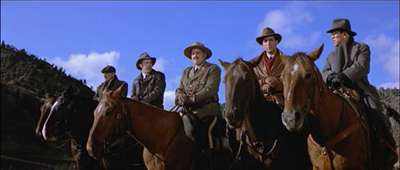 Last month, Drew Taylor posted an interview with Brian De Palma at The Playlist. Now it seems he's done another interview with De Palma, this time for moviephone. Sounds good to us-- Taylor asked De Palma some interesting questions, such as whether he has any desire to do a western. "Interesting that you say that," De Palma tells Taylor. "I think a Western is a very interesting genre. Unfortunately, I think The Lone Ranger has put it away for another couple of decades." When asked if he's seen that film, De Palma replies, "I was dying to see The Lone Ranger. I thought it looked great. And it was gone from the theaters before I had a chance."
Last month, Drew Taylor posted an interview with Brian De Palma at The Playlist. Now it seems he's done another interview with De Palma, this time for moviephone. Sounds good to us-- Taylor asked De Palma some interesting questions, such as whether he has any desire to do a western. "Interesting that you say that," De Palma tells Taylor. "I think a Western is a very interesting genre. Unfortunately, I think The Lone Ranger has put it away for another couple of decades." When asked if he's seen that film, De Palma replies, "I was dying to see The Lone Ranger. I thought it looked great. And it was gone from the theaters before I had a chance."After discussing Passion, Taykor turns the discussion to Redacted. "It's of course very similar to Causalities of War," De Palma tells Taylor, "and I was well aware that the film was not going to be well-liked in America because in America you can never criticize the troops. Of course that wasn't the case in the rest of the world." Asked if he was ultimately happy with the attention that film received, De Palma replies, "Of course. That's why I made it. I felt that our involvement in Iraq was criminal and we had invaded this country and destroyed it and then left and now we wonder why it's a chaotic mess. It just reminded me of the whole Vietnam thing and I was extremely incensed and I tried to put it in a movie."
'THE DEMOLISHED MAN', 'MINORITY REPORT', 'HAPPY VALLEY', NO DESIRE TO RETIRE
Here is the final stretch of the interview (you can read the entire thing at moviephone):
I saw Minority Report and told him how good I thought it was.
Was it similar to what you were going to do with Demolished Man?
Well. Sort of. The Demolished Man is a great piece of material that's owned by Paramount, if I recall. There were many screenplays that were written that I'm sure are over there in a vault, just millions of dollars against the material. It would have been a very big movie to do and probably not going to be done by me.
How are things going with Happy Valley?
We have a very good script and we're in the process of boarding and budgeting it now.
Do you want to return to bigger studio material afterwards?
I have a couple of projects I'm working on and people send me stuff all the time, like how this project came to me. Some of them I think are good ideas and some of them I don't. At my age, I'm trying to enjoy my life. Because what we don't have is a lot of time. [Laughs]
Do you ever think about retiring?
No I have no desire to retire. I just want to enjoy my time. Every day above ground is a good day.
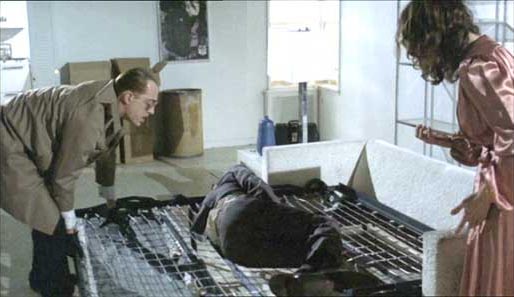
The article then moves on to the final dream sequence of Dressed To Kill:
“You make this stuff as slow as possible,” he murmured. “You’re just agonizingly building up.”
And then there are the shoes: “A lot of people have made remarks about the white shoes. Creepy white nurse’s shoes.”
 Roger Ebert.com's Peter Sobczynski posted an interview with Brian De Palma the other day, discussing Passion with a SPOILER WARNING. "In a weird way," Sobczynski says to De Palma, "with the increasingly cruel treatment that Christine perpetrates on Isabelle, the film sort of reminded me of Carrie, minus the supernatural element and with the cruelties transplanted from the locker room to the board room…"
Roger Ebert.com's Peter Sobczynski posted an interview with Brian De Palma the other day, discussing Passion with a SPOILER WARNING. "In a weird way," Sobczynski says to De Palma, "with the increasingly cruel treatment that Christine perpetrates on Isabelle, the film sort of reminded me of Carrie, minus the supernatural element and with the cruelties transplanted from the locker room to the board room…"DE PALMA SHOT TEST OF BALLET TO USE WHILE SHOOTING MURDER SCENE
In discussing the split-screen sequence in Passion, De Palma tells Sobczynski, "I used this particular piece in order to juxtapose Christine waiting for her lover with a ballet having to do with two dancers in a rehearsal studio who are going through their exercises while there is a growing sexual tension between them. I thought it would be an interesting juxtaposition between the two venues of action. It is very intricate but the advantage is that I shot a test of the ballet before I actually shot that sequence and when I was shooting the material of Christine being killed, I had my test footage of the ballet to play it against in order to determine how one scene juxtaposed against another and how it was working. By the time I got down to the shooting of the ballet, which was during the last two days of filming, I knew exactly what I needed in order to properly juxtapose the murder."
DE PALMA KNEW FROM EARLY ROLES THAT RAPACE COULD PLAY VULNERABLE
Sobczynski tells De Palma that when he first heard about the casting, he had assumed Noomi Rapace would play Christine and that Rachel McAdams would play Isabelle. "Fortunately," De Palma replies, "I had seen these Swedish movies that Noomi had done before she had become this international star of the Dragon Tattoo films where she plays this demonic creature—films in which she played vulnerable characters and mothers—and had sort of a fuller grasp of her acting talent."
'PASSION' DISTRIBUTION; 'PARANORMAL ACTIVITY'; FAV MOVIE CRITICS & OTHER DISCOVERIES
In discussing the VOD and limited theatrical release of Passion, De Palma tells Sobczynski, "That is the strategy of the distributor—they are the ones that paid for the movie and they have an idea about the best way to exhibit it in order to maximize their investment. I have no idea if this is going to make the movie any more successful as opposed to opening it in a more conventional way."
When asked how close he came to directing Paranormal Activity 2, De Palma tells Sobczynski, "Not very. Basically, I think one of the producers was an admirer of my work and they talked about it but nothing really came of it." When asked about the current state of film criticism, De Palma says, "I think that some of the best film critics nowadays are on the web. Dana Stevens over at Slate, Stephanie Zacharek over at the Village Voice—they write some of the best criticism around."
The interview ends with Sobczynski asking De Palma if there are any of his lesser-seen films he might like to see rediscovered. De Palma replies, "The public basically decides the movies that are going to be remembered and you have named a couple of them [Scarface and Blow Out]. Anyone who likes a director's work is exposed to them by the best-of movies, and then they start digging. Take someone like Fritz Lang—you start by seeing things like Metropolis or The Big Heat and the other fantastic films that he made and then you start exploring the ones that are less well-known. I assume that is what people do with me—they know the movies that are well-known and then ask 'Who is this guy?' and start digging into the others."
SOBCZYNSKI RANKS DE PALMA'S FILMS - 'BLOW OUT' TOPS LIST
Also posted that same day is Sobczynski's ranking of 27 of De Palma's films. "I have compiled the following retrospective look at his entire career (minus one or two obscurities)," Sobczynski explains in the introduction. "Some are better than others but with few exceptions, they are all the work of a singular director with a singular vision that stand out all the more amidst its committee-created competition and which make even his weakest efforts more interesting than the best works of most other filmmakers working today." Sobczynski's top three are Blow Out ("De Palma's masterpiece"), Femme Fatale ("this may be the most purely De Palma film of them all"), and Phantom Of The Paradise ("one of De Palma's most wildly entertaining films").
Sobczynski ranks Passion at #7 on the list, stating, "the film as a whole is a sexy stunner that is De Palma's most satisfying work since Femme Fatale." In contrast to Jake Cole's list from earlier in the week, Sobczynski ranks The Untouchables at number 5. Some possible surprises on Sobczynski's list: Raising Cain makes his top 10, Snake Eyes up at number 12 (even though "the ending is a bit of a letdown"), and Casualties Of War all the way down at number 23 ("I must confess that it is one that has never quite worked for me that well," writes Sobczynski). All the way at the bottom of the list is Get To Know Your Rabbit.
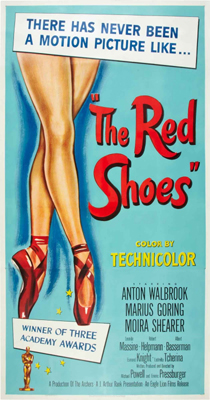 Yet another interview with Brian De Palma posted to the web today, this one from The Arizona Republic's Bill Goodykoontz. When asked about his strong visual style, De Palma responds, "I’m always composing for the big screen. That’s why we have operas and ballets. These are forms that have lived through centuries and they’re kind of specialized things that we get all dressed up to go see, and it’s kind of a big event. But the mass of visual entertainment is basically being watched on an iPad or an iPhone."
Yet another interview with Brian De Palma posted to the web today, this one from The Arizona Republic's Bill Goodykoontz. When asked about his strong visual style, De Palma responds, "I’m always composing for the big screen. That’s why we have operas and ballets. These are forms that have lived through centuries and they’re kind of specialized things that we get all dressed up to go see, and it’s kind of a big event. But the mass of visual entertainment is basically being watched on an iPad or an iPhone."Earlier in the interview, Goodykoontz had some questions for De Palma about dealing with sexuality on the set:
A: In this case, there’s not that much explicit sexuality. I mean, the girls are toying with each other all the time. These actresses (Rachel McAdams, Noomi Rapace) came to this because they liked acting together. They like this kind of twisted relationship, and they could tease each other and slam each other. It became an erotic fencing game they played. And that was the fun of it, and they really enjoyed doing it. But this isn’t naked girls running around in the shower, which is a whole different problem.
Q: A problem you’ve dealt with.
A: When you’re dealing with themes like that, like I had in Carrie, it’s incredibly difficult to do. A lot of these actresses had never been in a movie before, this whole naked shower scene, you know, they were all a little nuts. Fortunately Sissy (Spacek, the star) had to do all her stuff before, and when they saw Sissy doing it, they thought, “Well, God, if Sissy can do it, I can.”